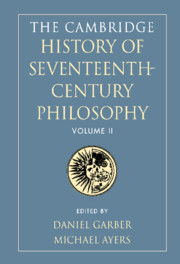28 - The cognitive faculties
from VI - The Understanding
Published online by Cambridge University Press: 28 March 2008
Summary
During the seventeenth century the major cognitive faculties - sense, imagination, memory, and understanding (or intellect) - became the focus of argument in metaphysics and epistemology to an extent not seen before. The theory of the intellect, long an important auxiliary to metaphysics, moved to the centre of metaphysical dispute, especially concerning the scope and powers of the intellect and the existence of a ‘pure’ intellect. Rationalist metaphysicians such as Descartes, Spinoza, and Malebranche claimed that intellectual knowledge, gained independently of the senses, provides the framework for constructing a new theory of nature. Other writers, including Hobbes and Gassendi, denied the existence of a distinct intellectual faculty, and so challenged the metaphysicians’ abilities to perceive the essences of substances directly. The theory of the senses, which had long been a part of philosophical discussion, took on a new urgency, for adherents of the new corpuscularian philosophy needed to replace the dominant Aristotelian theory of real sensory qualities and sensible species. The revival of scepticism and a renewed interest in method also brought the faculties into prominence, for sceptical challenges typically were directed towards the faculties of sense and understanding, and the theory of method was conceived as providing instructions for the proper use of one’s cognitive equipment.
- Type
- Chapter
- Information
- The Cambridge History of Seventeenth-century Philosophy , pp. 951 - 1002Publisher: Cambridge University PressPrint publication year: 2000
References
- 2
- Cited by

